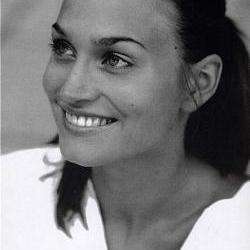After a trying end to last season for the opera world due to the global pandemic, Theater an der Wien has managed to open its doors this fall, to socially distanced sighs of relief from its masked audiences. Christof Loy’s new production of Ruggero Leoncavallo’s little-known Zazà is appropriate to the current moment, if slightly bland. Transplanted from its fin de siècle setting into something vaguely mid-20th century, even the more opulent gowns and costumes of the protagonist and her artist compatriots (Herbert Murauer) fade a bit into the sparse background. Massive walls and doors in white and brown (Raimund Orfeo Voigt) flank scenes set largely in places of limbo — the backstage of a theatre, an unfinished bedroom, a foyer — always slightly removed from more glamorous centres of the action. The action is centred in places where artists have always waited – to perform, contemplate their futures, and have their existential crises. In conformance with Covid restrictions, there are no huge group numbers. The choral contributions were canned pre-recordings of the Arnold Schoenberg Chor played from offstage, further heightening the “behind the scenes” sensation.
The plot and production centre on a variété star, Zazà (Svetlana Aksenova), who seems initially to have the world at her feet, performing with her ex-lover and mentor Cascart (Christopher Maltman) in a regional music hall. The opening act is full of back-stage bustle – ariettas and parlando patter dominate – until the star falls in love with Milio Dufresne (Nikolai Schukoff), a businessman in this production. Milio turns out to have a wife (Dorothea Herbert) and daughter, Totò (Livia Gallenga / Vittoria Antonuzzo), back in Paris, putting Zazà in a quandary. She herself suffered as a child, raised by an alcoholic single mother (Enkelejda Shkosa) in the slums until Cascart pulled her out and put her on the stage. The third act is one of the most effective; Totò’s dialogue with Zazà is followed by a simple piano solo which slowly blends into orchestral swells. In the fourth act, Milio is confronted and, when tricked by Zazà, reveals his true colours. “Squaldrina!” he screams, enabling Zazà to let him go. It is a rare example of a tragic, verismo opera where not a soul dies... neither by natural causes nor foul play.
While the work does not hold a candle to the same composer’s Pagliacci, there are magical moments, thanks largely to strong acting and singing by Aksenova, who barely gets a break during the two hour performance. Schukoff as Milio looks the part of the indecisive yet charming lover, but was vocally out of his depth. He wnet off his breath as the tessitura climbed – almost sounding as if he was marking – and pulling out the vocal rug from otherwise climactic moments, such as his “Mai più, Zazà” in Act 3. Zazà would have done well to stay with Cascart, at least as sung by Maltman, whose full-voiced rendition of “Zaza, piccolo zingara” was a highlight. Juliette Mars was effective as the long-suffering maid, Natalia, and Shkosa’s massive voice made her a wonderfully overbearing, boozy mother. The numerous smaller roles are largely forgettable, though well sung by the likes of Tobias Greenhalgh, Paul Schweinester and Dmitru Mădăraşăn.
Stefan Soltész led the ORF with increasing steadiness throughout the evening after getting off to a rocky start. Leoncavallo’s writing includes significant doubling between voice and orchestra, so if conductor and soloist diverge in intention at any point, it is hard to disguise. The opening act is particularly tricky – full of lines passed quickly between characters and instruments – and the bustle in the orchestra often overpowered the voices on stage. As tempi slowed, arias/duets appeared in more traditional formats and the ensemble thinned, consensus between soloists and orchestra increased.
This production is, all told, a successful introduction to a long-shelved work, and a most welcome opportunity to don not only dress skirts and slacks, but also our fanciest masks, and venture out to hear live music again in Vienna.




